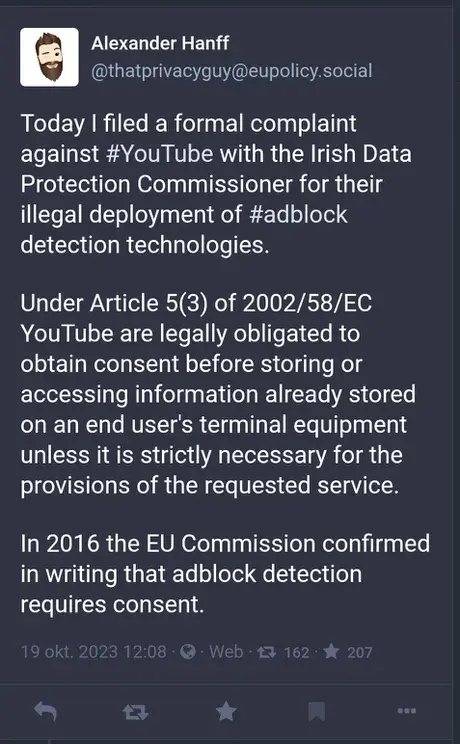- cross-posted to:
- [email protected]
- [email protected]
- cross-posted to:
- [email protected]
- [email protected]
Cross post from https://lemmy.world/post/7027225
Unfortunately it did not stop them from trying over here
I’m not in a position to look into it right now, but is there a part of the EULA that gives consent to detect ad blockers, and would that be good enough for the law referenced?
No, consent can’t be hidden in tos
Probably not.
A contract term that is illegal under local laws cannot be enforced.
If the process they are using to detect adblockers breaches EU laws, they cannot use the EULA to allow them to break the law.
Saw this pic floating around.

actual source of “this pic” https://eupolicy.social/@thatprivacyguy/111261130799704016
Thanks!
The picture was shared on other social media sites, I did not see it mentioned in Lemmy or similar.
Their obvious solution to this is make you consent to it or you can’t use YouTube.
which isn’t GDPR-compliant. you can’t force people to accept tracking if the service doesn’t require it to work.
God I love GDPR
Meanwhile in my country (New Zealand), privacy laws are slowly being eroded and government spying and censorship is increasing.
I wish we had GDPR.
Does it count as tracking though? What private or personal data is it? I’d also say that it’s at the very least grey area since all they’re doing is trying to prevent people from using their service in unintended ways, ie without ads.
common EU W
could some of you big brain people try and talk to the idiots who shout “BRÜSSZEL” at every issue here (Hungary)?
I would recommend people read the IAB ad blocker detection guide for Europe which provides a good summary of what is possible. It lays out the that depending on how the detection is done it might be defensible to rely on ToS, and to remove all risk, implement a consent banner, wall, or both.
Which is to say, even if it was ruled that YouTube can’t rely on ToS, which I don’t think is a sure thing, they would just have a consent wall like for cookies.
You can send your own complaint here:
Yes, the European Commission said that adblock detection is illegal back in 2016. But they believe it’s a legitimate interest, and said that they want to legalize adblock detection in a press statement back in 2017.
Can users still use ad blockers?
The proposal does not regulate the use of ad blockers. Users have the freedom to install software on their devices that disables the display of advertisement. At the same time, the Commission is aware that ‘free’ content on the internet is often funded by advertisement revenue. Important bit: Therefore, the proposal allows website providers to check if the end-user’s device is able to receive their content, including advertisement, without obtaining the end-user’s consent. If a website provider notes that not all content can be received by the end-user, it is up to the website provider to respond appropriately, for example by asking end-users if they use an ad-blocker and would be willing to switch it off for the respective website.
Edit: I highlighted where they state that they want to legalize adblock detection.
antiblick
We in South Africa rn?








